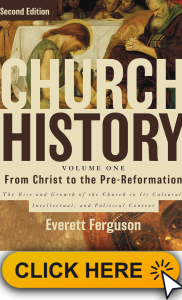
Church History, Volume One: From Christ to the Pre-Reformation: The Rise and Growth of the Church in Its Cultural, Intellectual, and Political Context
Do you want to learn about St. Augustine’s Conversion experience, who witnessed to him, and what other factors led to his coming to faith in Christ? This article will answer these questions and more. Augustine is already a Christian intellectually at the beginning of Book VIII of his Confessions, but he is not able to relinquish his worldy affairs.1 A prompting of God causes Augustine to seek out the counsel of Simplicianus, Ambrose’s spiritual father and successor as the Bishop of Milan.2 Simplicianus congratulates Augustine for studying the Platonists, in particular, the Neo-Platonists which, “in many ways, led to the belief in God and His word.”3 Simplicianus then tutors Augustine by divulging the story of Victorinus’ conversion.4 Victorinus had been an accomplished rhetor and distinguished adversary of Christianity, but publicly converted to Christianity as an elderly man.5 Accordingly, Augustine sees himself in the story of Victorinus and is reminded of the impact of the New Testament parables of the lost sheep and Prodigal Son.6 Augustine also reflects on the conversion of the Apostle Paul and the influence he extended as a previous opponent to the faith.7 Although Augustine “ burned to imitate” Victorinus, he felt bound by his flesh as he painfully deliberated over the possibility of a radically different faith and life.8 Augustine then describes a day when he and his friend Alypius were visited by Ponticianus who told them the story of Antony, a highly regarded Egyptian monk.9 Antony’s life provided the influential backdrop for two of Ponticianus’ friends’ decision of “forsaking all that they had and following Thee.”10 Augustine then retires to his garden with his friend Alypius under a crushing shame stemming from his inability to overcome his fleshly desires.11 A fight between two wills is then discussed by Augustine; however, he claims both contrary wills as his own, as opposed to the Manichaean doctrine that espouses a good will and a bad will.12 Finally, a broken Augustine landed under a fig tree in tears begging God to intervene.13 Through the sounds of his weeping heart, he heard a child’s voice from a neighbor’s house saying, “Take up and read; take up and read.”14 Interpreting the voice as a message from God, Augustine quickly retrieved his letters of St. Paul and started reading where his “eyes first fell.”15 Romans 13:13-14 immediately vanquished Augustine’s fears and he informed Alypius of his decision, who in turn, upon reading further to Romans 14:1 joined Augustine in his decision.16 Beyond the influence of individuals such as Ambrose, Simplicianus, and Ponticianus or Augustine’s background in Manichaeism and Neo-Platonism, other factors may have contributed to his conversion. Ferguson explains that Augustine’s early education in philosophy, the impact of Cicero’s Hortensius, and his study at Madaura and Carthage were integral to his intellectual development. Furthermore, Augustine’s mother was a Christian and his father, a pagan, was baptized prior to his death.17 All of these factors may have played a role in Augustine’s ultimate decision to dedicate his life to Christ.
Ferguson, Everett. Church History: Volume One: From Christ to Pre-Reformation: The Rise and Growth of the Church in Its Cultural, Intellectual, and Political Context. Grand Rapids, MI: Zondervan, 2005. Schaff, Philip, ed. Nicene and Post-Nicene Fathers: Volume 1: The Confessions and Letters of Augustin, with a Sketch of His Life and Work. Peabody, MA: Hendrickson, 1999.



i love it